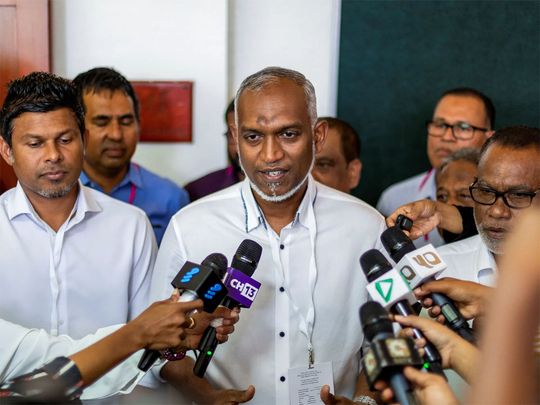
Mohamed Muizzu, the mayor of Male, won the Maldives’ presidency recently. He defeated the incumbent Ibrahim Mohamed Solih, securing 54 per cent of the popular vote in the second-round runoff. The transition will formally occur on November 17.
The election results highlight a society that is increasingly polarised between the pro-Western Maldivian Democratic Party (MDP) of Solih and Muizzu’s People’s National Congress (PNC), which is sceptical of the West. Within these groups, there is another, arguably more relevant, divide between what pundits describe as the pro-India and pro-China factions.
Maldives, a strategically important atoll of 1,000 islands, mostly uninhabited, lies at the crossroads of shipping routes in the Indian Ocean and has become a battleground for China-India competition. Both countries vie for influence over the country’s policies, which lie at the fault lines of Maldives’ domestic politics.
Muizzu’s PNC, under its previous leader Abdulla Yameen adopted China’s Belt and Road Initiative (BRI), securing more than $1 billion in assistance for infrastructure development. However, Yameen lost the 2018 elections to Mohammad Solih, who brought the Maldives back into India’s orbit.
Maldives’ foreign policy posture
New Delhi responded by investing millions of dollars in infrastructure development in the Maldives. By the end of 2021, the Maldives had racked up an equal amount of debt, 26 per cent of GDP each, to China and India. However, Solih is also accused of establishing systems of patronage over the years.
Muizzu’s election could have a significant impact on the Maldives’ foreign policy posture. He also took aim at the unbalanced trade relations between India and the Maldives, which he has promised to rectify.
In 2021, India’s exports to the Maldives amounted to $416 million, while it imported $49 million in goods from the Maldives. Meanwhile, China exported goods worth $395 million to the Maldives, and its imports were valued at a mere $3.9 million.
The Indian government is likely to continue funding the Greater Male Connectivity Projects, a 6.7km (4-mile) road project currently under construction that aims to link the capital, Male, with the island of Villingili. India has also provided the Maldives with a $100 million grant and a $400 million line of credit for the infrastructure initiative.
Characterising the previous administrations as pro or anti a major power may be simpler than the reality on the ground.
The incumbents did not declare themselves anti-China or anti-India. The previous presidents only tapped into available economic assistance opportunities. China’s BRI and deeper pockets make it a more attractive option for much of the world.
Burden of incumbency
Candidacy also compels adopting a degree of emotional rhetoric, while the burden of incumbency tempers it off, and moderation in policymaking takes over. The experience of presidential behaviour once they are in power is also a pointer to the rational approach the previous officeholders have adopted.
With its bold rescue effort in Sri Lanka after the country defaulted, India has demonstrated the capacity to commit resources needed to maintain its influence, regardless of which political party is in power in the Maldives.
A sharper turn towards China, which is likely to draw a backlash, is also not in its long-term interests. Chinese leadership, with its long-term view of history, will be quite mindful of such a possibility and will refrain from overtly pushing to occupy space in the Maldives.
Once formally in power, Muizzu will also need to demonstrate, beyond rhetoric, that the Maldives, because of its location and vulnerabilities, will not be a pawn in a big power game and will follow a policy of balance between the two Asian giants. This will be good for the Maldives and also for long-term stability in the region.
Sajjad Ashraf served as an adjunct professor at the Lee Kuan Yew School of Public Policy, National University of Singapore from 2009 to 2017. He was a member of the Pakistan Foreign Service from 1973 to 2008 and served as an ambassador to several countries.








